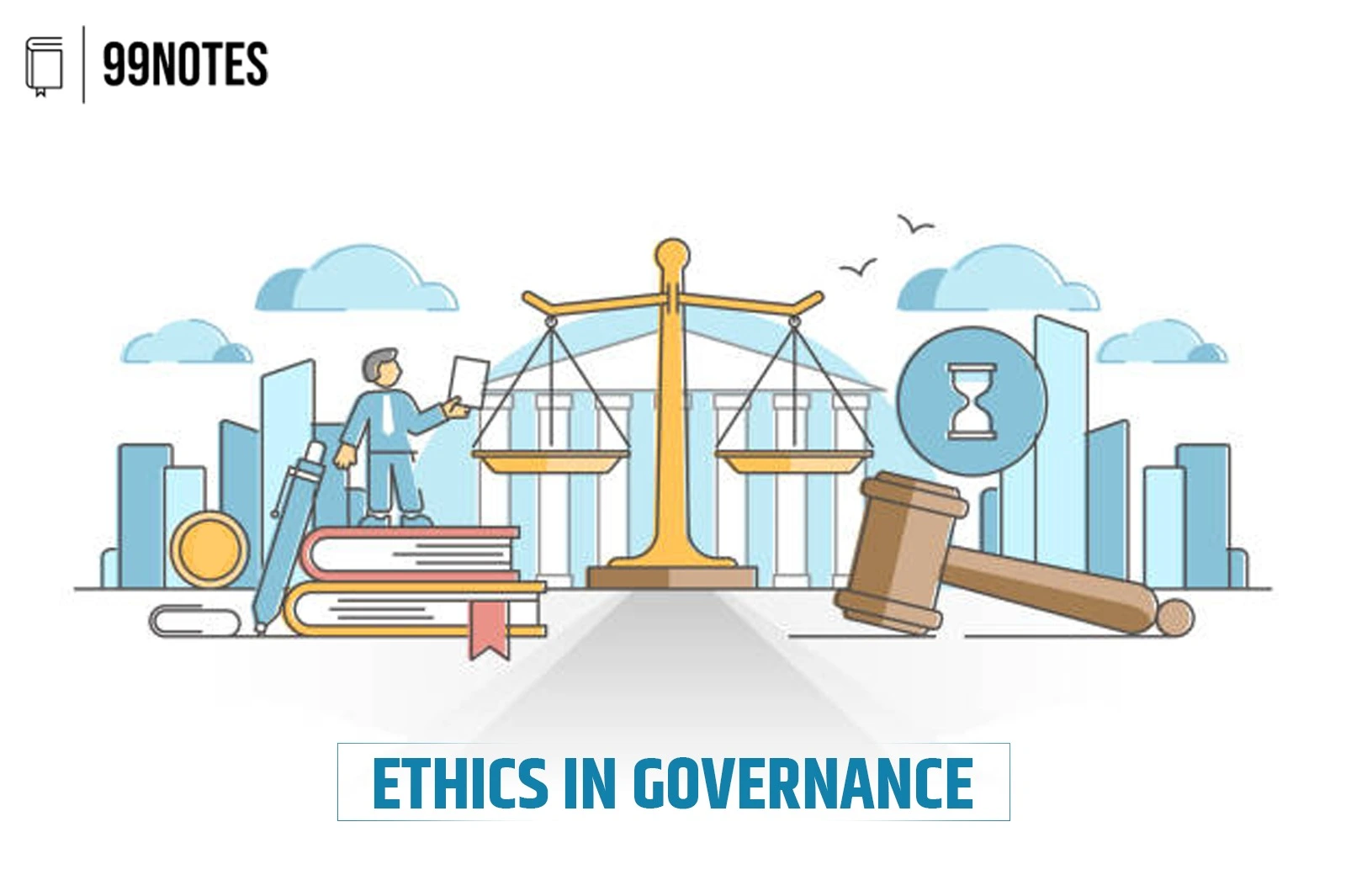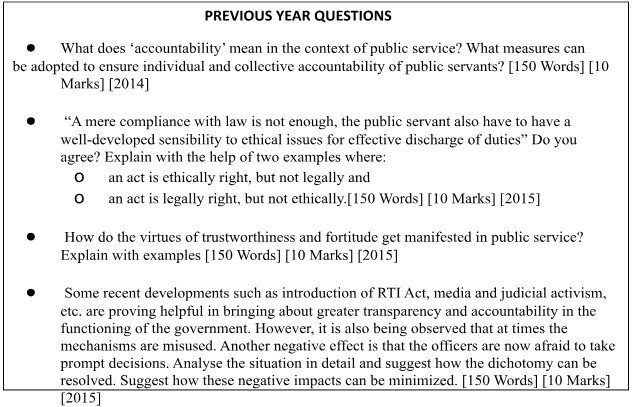Ethics in Governance
Ethical governance refers to a system of administration based on well-established principles of Ethics. Such governance is based on transparency, accountability, integrity, and fairness, ensuring public welfare, justice, and the rule of law while preventing corruption, bias, and unethical decision-making in governance.
Before understanding Ethical Governance in detail, we should understand “what is Governance”:
Governance
- Governance
- Important Aspects of Governance
- Ethical Governance
- Some Important Pillars of Ethical Governance
- Philosophical Basis of Ethical Governance
- Examples and Case Studies on Ethical Governance
- Patagonia: A Model of Environmental Stewardship
- The Volkswagen Emissions Scandal: A Lesson in Accountability
- New Zealand’s Approach to COVID-19: Fairness and Transparency
- How are accountability and ethical governance interrelated?
- Measures to ensure accountability bring in ethical governance:
- Conclusion
- FAQs related to Ethics in Governance
Governance refers to the structures, processes, and mechanisms by which organizations, institutions, and governments are managed, controlled, and held accountable. It ensures decision-making, policy implementation, and resource allocation align with legal, ethical, and societal expectations.
Important Aspects of Governance
- Objective Setting – Establishing clear goals and priorities.
- Monitoring Performance – Evaluating effectiveness and efficiency.
- Legal and Ethical Compliance – Ensuring adherence to laws and ethical standards.
- Stakeholder Engagement – Maintaining transparency and accountability.
Governance applies to various sectors, including corporate governance (businesses), public governance (government institutions), and non-profit governance (charities and international organizations).
Ethical Governance
Ethical governance refers to the system of rules, practices, and processes by which businesses, organizations, and governments conduct themselves in a manner that is honest, responsible, and respectful of all stakeholders involved.
It’s about making decisions that not only aim for success or profitability but also consider the welfare of employees, communities, the environment, and society at large.
For example– a government that enacts and enforces laws to protect the environment, ensuring sustainable practices and conserving natural resources for future generations
Some Important Pillars of Ethical Governance
- Transparency: Openness in operations and decision-making processes, ensuring that stakeholders understand how decisions are made.
- Accountability: Taking responsibility for actions and their impacts on society, the economy, and the environment.
- Fairness: Ensuring equitable treatment of all stakeholders, including employees, customers, and communities.
- Sustainability: Making decisions that not only benefit the present but also consider future generations.
Philosophical Basis of Ethical Governance
People think that the concept of Good Governance is modern. But they are wrong. Many times in the past, scholars have conceptualized what is good governance.
Kautilya
- Kautilya in his Arthashastra wrote, “In the happiness of subjects lies the happiness of king and in the welfare of subjects lies the welfare of king. ” Hence, he has written about Citizen-Centric Government.
- Kautilya has also highlighted the corruption & given the concept of Kantakshodhana ie, the king should purge those elements strictly.
Gandhi’s Vision of Ramrajya
- The vision of Ramrajya involves governance based on Moral Principles.
- In fact, Gandhi has said that a Government which is not working in people’s interest is morally corrupt.
- Swaraj i.e. Self Rule is one of the pillars of his concept of Ramrajya or Good Governance.
Aristotle
- He has divided the Government into two parts
- Perverted Government: Power is used in the interest of Ruling class
- Legitimate Government: Power is used in the Public Interest.
Examples and Case Studies on Ethical Governance
Have a look at some of the examples and case studies to understand the concept of ethical governance.
Patagonia: A Model of Environmental Stewardship
- Patagonia, the outdoor apparel company, exemplifies ethical governance through its commitment to environmental sustainability.
- It donates a portion of its sales to environmental causes, uses sustainable materials, and encourages consumers to buy less by offering durable products.
- Patagonia’s approach not only respects the environment but also builds long-term loyalty among customers, proving that ethical governance can drive success.
The Volkswagen Emissions Scandal: A Lesson in Accountability
- Contrastingly, the Volkswagen emissions scandal serves as a cautionary tale of what happens when ethical governance is sidesteined.
- In 2015, it was discovered that Volkswagen had been using software in its diesel vehicles to cheat on emissions tests, falsely portraying their cars as more environmentally friendly than they were.
- This breach of trust resulted in billions of dollars in fines and a damaged reputation, highlighting the importance of accountability and transparency.
New Zealand’s Approach to COVID-19: Fairness and Transparency
- The New Zealand government’s handling of the COVID-19 pandemic is a testament to ethical governance in action.
- Through clear communication, transparent decision-making, and equitable health measures, the government not only managed to control the spread of the virus effectively but also maintained high levels of public trust and cooperation.
- This case demonstrates how ethical governance can lead to positive outcomes even in the face of global challenges.
How are accountability and ethical governance interrelated?
Accountability ensures those in positions of power or decision-making are held responsible and answerable for their actions. Ethics in governance is required for a welfare society. To contribute to a better society in terms of freedom, equality, fraternity, and social justice, it is important for the body of governance to inculcate ethics and moral values through society, education, family, friends, etc.
Measures to ensure accountability bring in ethical governance:
Various measures to ensure accountability bring in ethical governance with a display of values like Equality, Dignity, Honesty, Fairness, and Compassion.
- Mechanisms like social audits in MGNREGA, and Gram sabha involve people in the decision-making process. This ensures accountability as well as equality principle as decision making is not left in the hands of few people.
- DPSPs are fundamental in the governance of the country. They ensure vulnerable and marginalized are not left out. Lawmakers with the responsibility to ensure socio-economic democracy come out with legislations and affirmative action leading to an inclusive society. Ex: Rights of persons with disability Act 2016, Maternity Benefit Act, NSAP.
- Legislative means like RTI and PCA make the administrative system transparent and minimize corruption in the system.
- A system of checks and balances makes sure there is no concentration of power and each organ is accountable for their actions. Thus, governance is carried out in the interests of the people. Ex: Judiciary through Review power(A-32) strikes down laws that are inconsistent with constitutional values.
Conclusion
In summary, Accountability fosters openness, responsibility, and trust across a wide range of sectors, including government, business, public service, and personal relationships. It is critical for sustaining integrity, keeping standards, and ensuring that activities match with stakeholders’ expectations and beliefs.
Ethical governance is about making the right choices for the right reasons. It requires a commitment to values that transcend profit and power, aiming instead for a positive impact on society, the environment, and future generations.







![Mauryan Empire (321-185 Bce): Rulers, Map, &Amp; Administration [Complete Notes For Upsc Exams] | Updated April 24, 2025 Mauryan Empire (321-185 Bce): Rulers, Map, &Amp; Administration [Complete Notes For Upsc Exams]](https://www.99notes.in/wp-content/uploads/2023/04/mauryan-empire-99notes-upsc-1-768x495.webp)